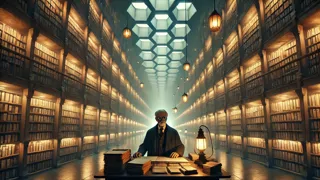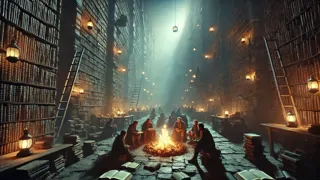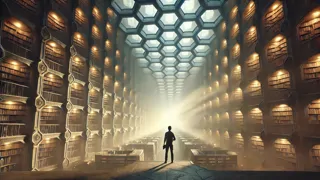Introduction
In the shifting mist of early morning, as the day breaks over the city of Buenos Aires, an extraordinary structure stretches across both reality and dream, holding within its depths the sum total of all that could ever be written. Hector stood before the monumental entrance to the Library of Babel, its columned façade dissolving fluidly into a labyrinthine network of corridors that seem to spiral beyond the reach of memory or reason. Dust motes danced in slanted beams of soft sunrise, floating above ancient stone steps, as if time itself hesitated to enter. The air was alive with a low hum, vibration carried most from the restless flipping of infinite pages—a background orchestra of endless, murmured wisdom and madness.
The entrance itself was humble, trailing off into shadowed corridors, which beckoned the solitary figures who entered, driven by the urge to uncover the secrets within. Hector, a solitary seeker ravaged by sleepless curiosity, stepped across the threshold with nothing but a notebook and a gnawing sense of hunger—for answers, for meaning, for a purpose buried beneath unfathomable cascades of bookshelves. The Library stretched universally, its innumerable hexagonal galleries joined by winding staircases, bridges of iron and wood, and ancient marble promenades that echoed every footfall. Sconces flickered against the darkness, sometimes replaced by phosphorescent bulbs that hummed, yet could not banish the gloom in distant wings.
Within, the perception of time faltered; Hector felt most hours slip from his grasp as each gallery offered variations of the written word—encyclopedias written in languages no one had spoken for millennia, riddles in scripts never decoded, tomes filled with poetry and babble alike. Some books contained maps to nowhere, some sketched out architectures of civilizations no eye had ever seen. On certain shelves, he found fragments of his own life woven into stories and tragedies penned decades or centuries ago, the ink still drying as if written just now. It was a place both comforting and terrifying, where every answer was hidden and every truth possibly a lie. Yet, with every step forward, Hector sensed an old promise—that in the infinite, the essence of wisdom might be found, if only one held the courage to persist.
Section I: The Hexagonal Galleries and the Keeper of Indices
Hector’s first encounter within the Library embodied the duel between hope and despair. He wandered down the initial curved corridor, following the pale, uneven light that barely revealed the numberless hexagonal galleries. Each one was vast, its six walls lined completely with books of identical format—hundreds of pages, every page filled with a symphony of letters. Some scripts he read fluently, others dazzled the mind with their cryptic symbols.

In the earliest phase of his journey, Hector kept to the periphery, seldom straying far from the main axis for fear he might lose his way. Every gallery contained five doors, leading further into the unknown. Occasionally, staircases coiled up or down, promising new levels deeper into mystery. He soon learned that no pattern governed the contents of the shelves. In one alcove he found a book filled entirely with a single, recurring phrase: «el laberinto se encuentra en ti.» In another, an encyclopedia of forgotten reptiles, illustrated with vivid, impossible colors. Next, a treatise on silence, written in the negative space between paragraphs.
Hector passed others like himself—some seated cross-legged, hunched over books, lips moving in silent debate; some staring wide-eyed into intricate charts; others immobile, turned inward, lost to time. Some shared their discoveries eagerly, others eyed him with suspicion or weariness. One elderly woman, wrapped in a bright red scarf, clutched a volume titled ‘The Book of Answers That Only Cause More Questions.’ She whispered, “Each solution is a door to a deeper puzzle. Don’t lose yourself on the bridges.”
After what might have been days, Hector’s curiosity led him to an alcove at the juncture of three galleries, where he met the Keeper of Indices. The Keeper, a gaunt librarian in a threadbare suit, regarded Hector over half-moon spectacles. His space was marked by towers of catalog cards, each meticulously hand-scribed. In the hush, the Keeper explained the central paradox: “You see, dear reader,” he said, voice echoing in the high chamber, “this Library contains all possible books—all permutations of letters, all sentences ever written, every truth, half-truth, and untruth you could imagine. Any answer you seek exists, and so does its opposite. Here, the index is hope’s companion and despair’s herald.”
With trembling fingers, Hector leafed through an index, seeing titles both familiar and alien—manuals for forgotten machines, the lost diaries of explorers, correspondence between unlikely lovers, treatises on nothingness. He asked about a book rumored to hold the secret of happiness. The Keeper smiled, producing a card. “This book exists many times over. You may find it written in words you know but meanings you can’t recognize. Or perhaps on a shelf you once passed by, disguised as a treatise on sadness.”
The search for meaning, the Keeper warned, was not a straightforward path. Many seekers had wandered so long, lost in recursive chambers, that they forgot their questions entirely. The index was both a guide and a labyrinth. “Every book is a strand,” the Keeper concluded, “but most will never be united into a single truth.” With that, he fell silent, leaving Hector amid the wavering glow of lanterns and the infinite sea of possibility.
Section II: Navigating the Recursive Labyrinth and the Plight of the Pilgrims
As Hector ventured deeper, the galleries multiplied, the ambient hiss of secrets growing louder. Eventually he realized that the Library’s geometry defied conventional understanding—corridors looped back on themselves, sometimes leading to hidden mezzanines or sunken alcoves where reality felt strangely warped. Some corridors seemed to defy gravity, rising and falling with dizzying unpredictability. Each level revealed another layer of complexity.

A fever dream of books awaited: some contained nothing but nonsense; others, though legible, told contradictory stories in parallel universes. More than once, Hector discovered a book that described, in uncanny detail, the very room he occupied—the precise arrangement of shelves, the flicker of lantern light, even the beating of his heart as he read. In these moments, he felt as though a cosmic observer looked over his shoulder, penning the same tale in a million variations.
Questions plagued him. Was there a pattern? Did meaning emerge from the chaos, or was every search ultimately fruitless? Doubt threatened to consume him, an inner echo to the labyrinth’s endless passages. In the gloom, Hector encountered a ragged group known as the Pilgrims—seekers who moved in cautious circles, carrying worn satchels packed with blank books. They chronicled not what they learned, but what they failed to find. Their leader, Lucía, explained their ritual: “We journey, not for an answer, but to witness the act of searching. In the blank pages, we remember our questions, even as the answers mutate and drift away.”
Hector spent time with the Pilgrims, joining their nightly vigils. Around dim campfires, built from the wood of fallen shelves, they recited passages from books they’d encountered. Some stories contradicted sharply, others resonated in unexpected ways—brief patterns emerging, as if from the swirl of a kaleidoscope. One night, Lucía showed Hector a book filled with only the word ‘Why.’ “It’s both an answer and a question,” she said softly. “That’s all the Library can promise.”
He found comfort among the Pilgrims, but their cyclical journeys reminded Hector of the library’s own recursive nature. After weeks—perhaps months?—Hector grew restless. He set out alone, compelled by a strange dream in which he glimpsed a gallery wreathed in starlight, where a single voice whispered, “Every story is woven from longing.”
As he pressed on through the library’s borderless maze, certain galleries grew quieter. Dust thickened on the shelves. Occasionally, he encountered the remains of abandoned camps, books scattered on the floor, their pages fluttering in the constant draft. Sometimes he heard distant laughter or sobbing, echoing through unseen vents—ghosts of those lost along the way. Still, he moved forward, clinging to hope, driven by an unquenchable thirst to glimpse a truth more luminous than the sum of all these words.
Section III: The Gallery of Mirrors and the Embrace of Paradox
Hector’s journey led him, eventually, to a gallery unlike any other. Here, a shifting blue-white glow shimmered from mirrored surfaces inset between the bookshelves. On every wall, panel, even the floor and ceiling, glass fragments captured and bent the light, reflecting and multiplying both Hector’s figure and that of countless strangers—each different, yet each somehow still him. The books in this strange gallery dazzled: familiar titles interleaved with their opposites, stories of joy shadowed by sorrow, explanations accompanied by riddles.

He realized, with a strange ache, that this was not just a gallery of mirrors, but a hall of selves. Hector saw himself searching, finding, despairing, hoping. Some reflections carried despair in their eyes; some radiated a tranquil acceptance. He reached for a book titled ‘On the Nature of Search.’ Opening it, he found the pages blank—but as he looked closer, words shimmered and assembled, spelling out his own thoughts in real time. The act of reading shaped the text. Every truth he held, every fear he wrestled with, spilled onto the page at the moment he recognized it.
Through the mirrored prisms, Hector glimpsed the other inhabitants of the Library: the Keeper still cataloguing, Lucía lighting a fresh fire in the mezzanine, pilgrims wandering in circles. The Library was not simply a structure of stone and paper, but a living pattern unfolding in the minds of its seekers. Here, past and present, memory and possibility all intertwined.
As Hector finally understood, he realized that wisdom was not a destination but an ongoing act of confrontation with mystery. In the infinite recursion of shelves and stories, wisdom lay in embracing questions, in recognizing that meaning is shaped continually as one moves forward. The Library would never yield a singular, all-encompassing answer. Instead, it offered endless mirrors—each reflection a possible self, each question a door to deeper understanding.
With this acceptance came a gentle gratitude. Hector tucked his notebook into his pocket, took one long, last look at his many reflected selves, and stepped back into the endless galleries—not as a seeker lost, but as a participant in the Library’s eternal dance between knowledge and the unknown. The restless pages whispered after him, a chorus of questions and longings, echoing through the vast heart of the Library of Babel.
Conclusion
The Library of Babel carried its secret as quietly as it did its infinite shelves. In its depths, the promise of absolute knowledge revealed itself as a mirrored paradox—within infinity, certainty could never be found, only encountered for an instant before dissolving again into a tide of words. Hector, changed by his journey, emerged from the Library’s shadows not with a singular answer, but with a mosaic of questions and moments of understanding, each more precious for their evanescence.
Meaning, he learned, wasn’t a finished book locked behind a shelf or a code cracked at last. Rather, it was the echo of seeking, the courage to walk hallways where every turn birthed more hallways, to gaze at himself—at all the possible selves—reflected in the glass. The Library’s wisdom was quiet, patient, and merciful. It reminded him and all who wandered there that the greatest truths lived not within any single volume, but within the living act of searching. Perhaps the only certainty was this: to question is to become, and through becoming, every soul writes not just their own story, but helps to shape the living Library itself.
As Hector crossed back into morning, Buenos Aires bustling but forever changed, the Library remained: vast, eternal, its doors open to anyone willing to explore the infinite possibilities of the written word, and, through that search, discover themselves anew within the world’s most mysterious pages.


















